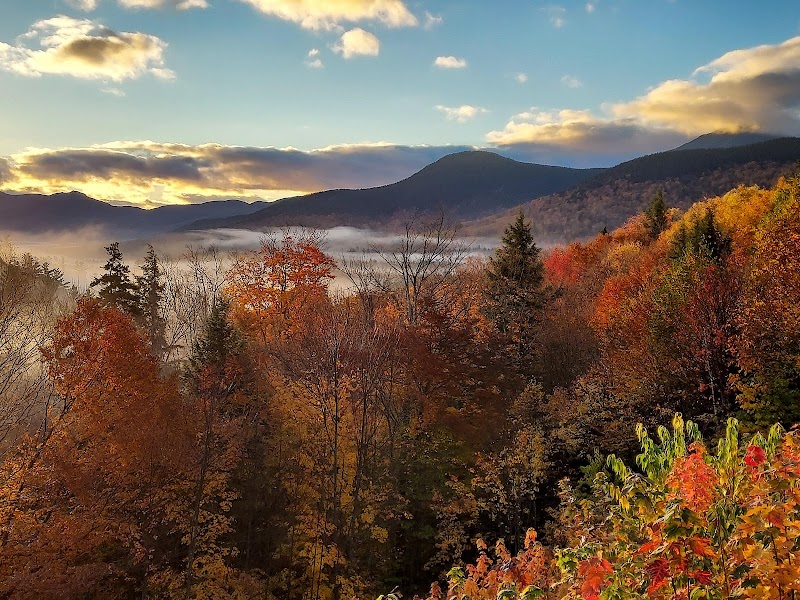
climbing tours near Franconia, New Hampshire
While Franconia, New Hampshire does not feature formal climbing tours, its granite cliffs offer a rugged playground for climbers ready to embrace independent adventure. Explore nearby hubs like Lincoln for guided climbing experiences and discover the best outdoor adventures in the region.
Research Local Climbing Routes
Study route guides for areas like Cannon Cliff or Echo Lake before setting out, as most climbs here require self-navigation or private guide arrangements.
Bring Proper Climbing Gear
Essential equipment includes climbing shoes, helmet, harness, and climbing ropes suited to traditional granite terrain for safety and performance.
Plan for Approach Hikes
Many climbing routes require a hike of 1–3 miles into the base; wear sturdy footwear and carry water to prepare for changing trail conditions.
Check Weather Conditions
Granite slabs become slick when wet; avoid climbing during or after rain and be aware of temperature shifts that can affect grip and safety.
climbing tours near Franconia, New Hampshire
Climbing Tours Near Franconia, New Hampshire: The Granite Playground for Rock Enthusiasts
Franconia, New Hampshire, known for its dramatic White Mountains and rugged landscape, offers a compelling destination for outdoor adventurers. Yet, when it comes to organized climbing tours near Franconia, the area is more known for self-directed rock climbing and bouldering rather than guided climbing tours. The local terrain features granite cliffs and slabs that challenge climbers while immersing them in raw nature that is fiercely itself.
The town provides access to climbing hotspots like the Cannon Cliff area and Echo Lake, but no widely recognized commercial climbing tours operate directly out of Franconia. Experienced climbers usually navigate these routes independently or with private guides arranged ahead, focusing their efforts on classic climbs such as the Pinnacle or the Diagonal Route on Cannon Mountain.
While there’s no formal climbing tour industry here, the spirit of the climb pulses through this rugged mountain region. The granite cliffs dare you to make technical moves and respect the mountain’s force. Preparation is key: come equipped with climbing shoes, harness, helmet, and local knowledge. Access to the cliffs often requires a hike, so blend your climbing plans with a sturdy approach walk through forested trails where the breeze teases the pines and the mountain air sharpens focus.
For those truly drawn to climbing but seeking more guided options, nearby larger hubs like Lincoln or North Conway offer outfitters with guided excursions and courses. These places are just a short drive from Franconia and cater to climbers of all levels, from beginners eager to learn the ropes to experts looking for new routes.
Below on this page, you will find links to the best outdoor adventures in Franconia, New Hampshire, including hiking, paddling, and winter mountain sports, that complement your climbing interests and round out your mountain experience.
Whether you’re planning a solo climb, a climb with friends, or a mixed adventure day, Franconia’s granite cliffs offer a raw, natural challenge that demands respect and rewards precision. Stay safe, stay informed, and prepare to engage with a wild landscape that moves in its own deliberate rhythm.
Nearby Trips
All Adventures
Boat Charters
Water Activities
Adventures near Franconia, New Hampshire
Discover the unique and memorable adventures that make Franconia, New Hampshire special.
Frequently Asked Questions
Are there guided climbing tours available in Franconia, NH?
Franconia does not currently offer formal climbing tours. Climbers typically explore routes independently or hire private guides. Nearby towns like Lincoln may have outfitters providing guided climbs.
What type of rock will I be climbing on near Franconia?
The region’s climbing routes are predominantly on granite, known for its solid, rough texture which provides excellent holds but demands respect for its sharp edges.
Do I need a permit for climbing in Franconia?
Most climbing areas near Franconia are on public lands without a permit requirement, but always check local regulations and respect private property boundaries.
What’s the best season for climbing in the Franconia area?
Late spring through early fall offers the best conditions. Summer provides stable weather, while fall adds scenic foliage but cooler temperatures.
Are there any safety concerns unique to this area?
Granite can become slippery when wet, so avoid climbing when rain is recent or forecasted. Additionally, approach trails vary in difficulty, so prepare for rough terrain and potential wildlife encounters.
Can beginners climb in Franconia?
While self-guided climbs are common, new climbers should consider hiring local guides or attending courses in nearby areas to build skills that fit this region’s demanding granite routes.
Recommended Gear
Climbing Shoes
Provide grip and precision on granite surfaces; critical for safe and effective climbing.
Climbing Helmet
Protects from falling debris and bumps on steep cliffs, mandatory for self-protection.
Harness and Rope
Allows secure ascending and descending on trad routes; ropes must be durable for granite friction.
Approach Shoes or Hiking Boots
Needed for hikes to the climbing base; sturdy soles and ankle support help on uneven terrain.
Local Insights
Hidden Gems
- "The lesser-known Burbank Trail offers quiet access to climbing basepoints with fewer visitors."
- "Views from the ledges above Echo Lake are often overlooked but reveal stunning mountain reflections."
Wildlife
- "Keep an eye out for peregrine falcons nesting on cliffs, a rare and protected species in the White Mountains."
- "White-tailed deer are common in wooded areas around climbing approaches and can be seen in early mornings."
History
"Franconia and the surrounding White Mountains carry a legacy of early American rock climbing pioneers who developed key routes in the late 19th and early 20th centuries."
